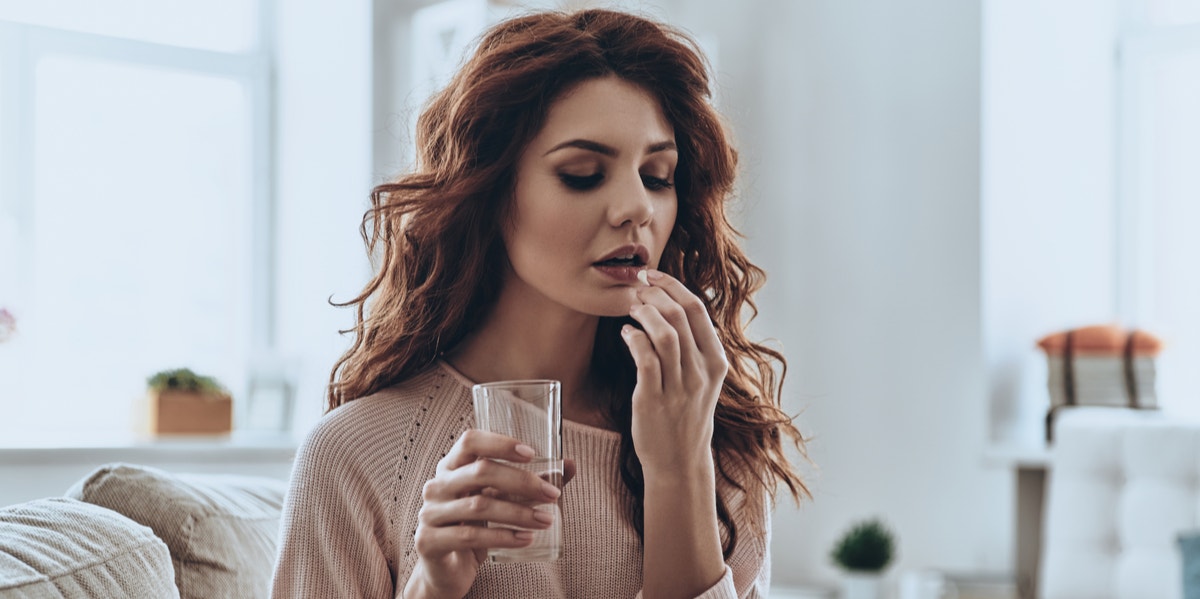Psych Meds Saved Me From Clinical Depression — And I'm Not Ashamed
Sadly, we still don't accept mental illness as real. That needs to change.
 G-Stock Studio / Shutterstock
G-Stock Studio / Shutterstock Everyone cheered when Obamacare offered mental health parity. Strangely, none of those mentally ill people came out to personally say how the bill would affect them — how it would affect their therapy visits, their psychiatric care, and their drugs.
The silence on psychiatric medications was particularly deafening, especially considering that 1 in 5 Americans take them. Psych drugs carry a lingering whiff of shame, a pervasive sense of your-fault-ism.
I am one of the drugged.
I've tried cocktails and concoctions to treat my depression and anxiety. In my time, I've swallowed Zoloft and Wellbutrin, your run-of-the-mill antidepressants.
I've used the anti-seizure drug, gabapentin, off-label for clinical depression.
I've tried anti-anxiety Xanax and Klonopin.
I've sampled heavy-hitter Lithium.
I've gobbled atypical antipsychotics, Geodon and Latuda.
I've sampled a pharmacopeia.
Tell someone you're depressed and they pat your back, telling you you're okay. Tell someone you're on medications and the questions start.
In "Big Pharma and Ableism," Camilla Laurentine discusses the ableist responses to chronic pain. Depressed people get the same thing, and it focuses on our medication.
I had a dear friend tell me that one day when I didn't have to be there for my family, I could stop taking my drugs and manage my "issues." She was too sweet for me to tell her that without drugs, I'd manage my issues... right off a bridge.
Here's the kicker: psychiatric medications save lives. Medication saved me from depression.
They save lives literally when they keep people from suicide; they save lives metaphorically when they allow people to carry on normal, productive lives.
We need these drugs. I need these drugs.
I've had people tell me to change my diet, and, like Laurentine, I hate to admit that my gluten intolerance made my depression worse, lest it encourages this nonsense. I've had hippies tell me to take magnesium supplements or filter the fluoride from my water. Do yoga, people urge, or take up acupuncture.
Don't you know those drugs make you senile? They deride my lovely psychiatrist as nothing but a pill-pusher and say that I need to go off all meds, completely.
Yet, we'd never tell a diabetic to throw away her insulin. We accept physical disease as an illness because it's centered in the body. We can point to an organ, a tumor, a system and say, "This doesn't work."
But we still don't accept mental illness as real.
There's still an ableist sense that if we mentally ill folk only thought hard enough, we'd work our way out of depression or anxiety. We could heal ourselves if we only tried hard enough. Medication is the chump's way out.
Medication isn't fun. Psychiatric drugs have numerous side effects, including lowering your libido. The heavier the drug, the worse the effects — insomnia, constipation, twitchiness, somnolence, rank bitchiness, and constant exhaustion are only some of the ones I've experienced.
One medication put me in a heroin-addict-like state if I took it with too many carbohydrates. This isn't an exaggeration; I couldn't do anything but lay on the couch and slur my words until help arrived. But that drug kept me stable until the side effect profile got too bad.
No one in their right mind would take this stuff if we could solve our problems by filtering out the fluoride from our tap water. When people make these suggestions, however well-meaning, they deny the reality of my disease. They suggest that if I really tried hippie solution X, I could throw those pills away.
Newsflash: I need those pills. They keep me from living a life of misery and anxiety. They keep me from killing myself.
I've needed those pills since I was seven, when I laid awake for hours every night, convinced the drug dealers were coming to kill me.
I needed those pills in sixth grade during a year-long slog without friends.
I needed those drugs in tenth grade when I began cutting myself and stopped eating in the desperate hope that someone — anyone — would notice.
I tried to OD in college.
I spent grad school suspicious that no one liked me, believing I was friendless and alone.
I finally got those drugs when I was 26, when my prenatal depression approached levels I now know to be hospitalization-grade. They kicked in almost right away and a light went on.
I've been on one form or another of psychiatric medication ever since. And while my medication may need to be tweaked, I have never again made concrete plans to drive off a bridge because this medication saved me from depression.
I refuse to be ashamed of my mental illness. It's a quirk of my brain, a malfunction of dopamine and serotonin.
It's not my fault. It doesn't make me weak; it makes me need pills. And I have no shame in taking them.
Elizabeth Broadbent is a regular contributor to Scary Mommy and ADDitude Magazine. Her work has appeared on Today Show Parents, Babble, xoJane, Mamapedia, and Time Magazine Ideas.

